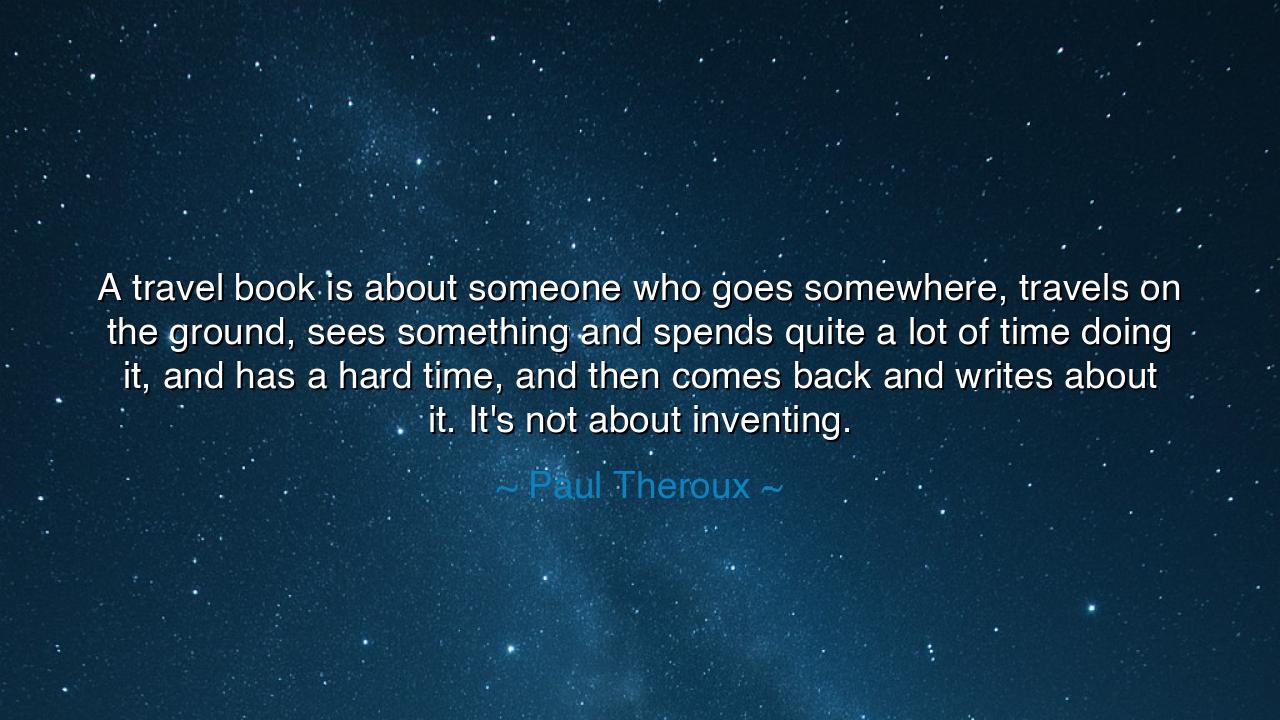
A travel book is about someone who goes somewhere, travels on
A travel book is about someone who goes somewhere, travels on the ground, sees something and spends quite a lot of time doing it, and has a hard time, and then comes back and writes about it. It's not about inventing.






Paul Theroux, pilgrim of rails and rivers, once declared with the firmness of experience: “A travel book is about someone who goes somewhere, travels on the ground, sees something and spends quite a lot of time doing it, and has a hard time, and then comes back and writes about it. It's not about inventing.” In this statement lies a profound defense of authenticity. For Theroux teaches that the essence of the travel book is not the weaving of fantasies, but the endurance of the journey itself. It is the blisters of the road, the dust of the track, the fatigue of waiting, and the unexpected trials that lend truth to the narrative.
The origin of this saying rests in Theroux’s long career as one of the masters of modern travel writing. His books—whether charting the long routes of trains across Asia in The Great Railway Bazaar or exploring the heart of Africa in Dark Star Safari—were born of true journeys, undertaken at length and often in hardship. He rejected the notion of the armchair traveler who merely imagines. Instead, he insisted that the writer must go, see, endure, return, and then speak. The travel book, in his eyes, is an act of witness, not invention.
This truth is not new. The ancients understood it well. Herodotus, called the father of history, traveled through Egypt and Persia, gathering accounts of what he saw with his own eyes and what others recounted to him. Marco Polo likewise endured the perils of deserts and seas, documenting the wonders and customs of lands far from Venice. Their tales endure precisely because they were rooted in the sweat of actual journeys. When Theroux warns that the travel book “is not about inventing,” he places himself in this lineage of travelers who sought truth, even when the truth was difficult or strange.
Consider the life of Ibn Battuta, who journeyed more than seventy thousand miles across the known world of the fourteenth century. His writings, while colored by perspective, were not inventions but reflections of the marvels and hardships he truly encountered. His accounts live on today not because he imagined distant lands, but because he walked their streets, prayed in their mosques, crossed their deserts, and sailed their seas. His example, like Theroux’s words, teaches that the authority of travel writing comes not from fantasy, but from lived experience.
Theroux also reminds us of the value of difficulty in storytelling. The hardships of travel—the delays, the discomforts, the dangers—are not hindrances to the story but its very substance. Without struggle, there is no transformation; without trial, there is no depth. A true travel book records the resilience of the traveler, how he endures the unexpected, and how he is changed by the encounter. To invent an easy story is to rob it of its truth, but to endure a hard one is to give it life.
The lesson, then, is clear: authenticity is greater than invention when it comes to bearing witness to the world. To write of travel, one must first travel; to speak of the world, one must first see it. This applies not only to literature but to life itself. If we wish to tell true stories—of friendship, of labor, of love—we must first live them deeply. Words gain power when they are rooted in the soil of lived reality. Truth, even when rough, carries more weight than invention, however polished.
Practically, this means embracing the journey rather than avoiding it. If you aspire to speak of places, go and see them with your own eyes. If you desire to tell the story of people, live among them and listen to their voices. Do not be afraid of hardship, for it will give depth to your understanding. And above all, resist the temptation to invent what you have not lived—for though invention may glitter, it will not endure like truth.
Thus, Paul Theroux’s words stand as both a commandment and a challenge: “A travel book…is not about inventing.” Let them remind us that the world is vast and real, waiting to be touched, walked, and endured. Let us be travelers not only of roads, but of truth—so that when we return and speak, our words will carry the weight of authenticity, and our stories will be rivers in which others may see the reflection of the real world, shimmering and alive.






AAdministratorAdministrator
Welcome, honored guests. Please leave a comment, we will respond soon